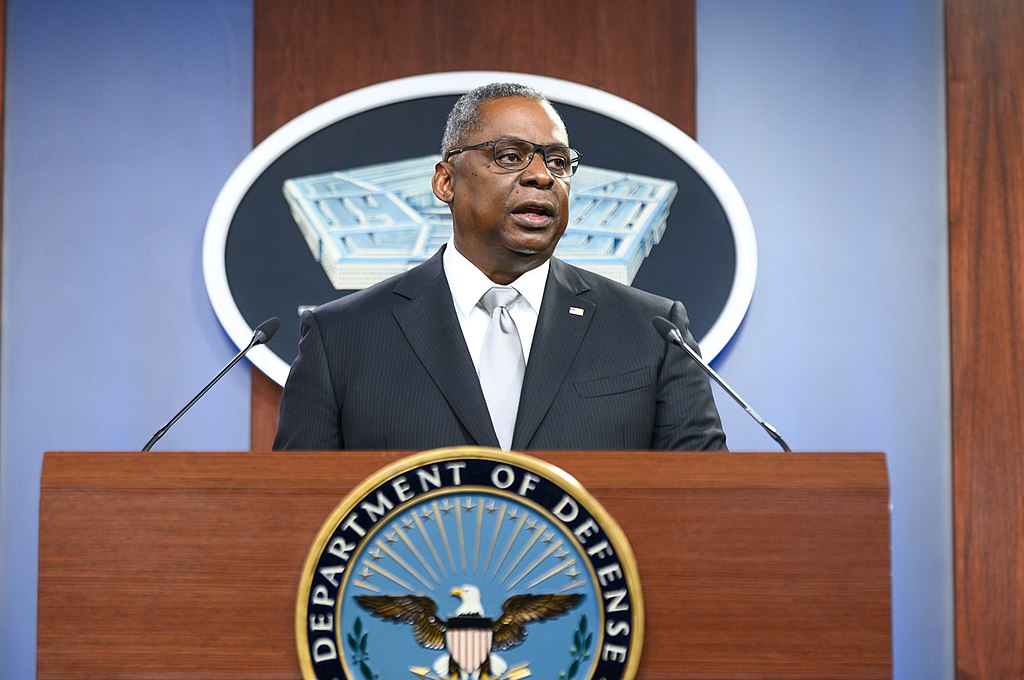Austin Hid Cancer Diagnosis
"This is not the way it is supposed to go," indeed.

The comments section of Sunday’s post “The Case of the Missing SECDEF” quite naturally contained considerable speculation as to the “recent elective medical procedure” about which Secretary of Defense Lloyd Austin failed to inform the President, the National Security Advisor, or even his own Deputy. Now we know.
BBC (“US defence secretary Lloyd Austin kept cancer diagnosis from the White House“):
President Joe Biden was only told that US Defence Secretary Lloyd Austin was being treated for cancer on Tuesday, the White House has said.
Mr Austin, 70, was admitted to hospital on 1 January and then to the intensive care unit for complications following surgery in December.
He has faced criticism for not telling senior officials about it for days.
He has since apologised for not “ensuring the public was appropriately informed”.
[…]
At a press briefing on Tuesday, National Security Council spokesman John Kirby said that President Biden was only informed that day about the diagnosis of prostate cancer.
“Nobody at the White House knew that Secretary Austin had prostate cancer until this morning,” he said.
While he emphasised the president’s initial reaction was concern for the secretary’s health, Mr Kirby acknowledged the communications were “not optimal.”
“This is not the way it is supposed to go,” Mr Kirby said.
Mr Biden and Sec Austin have not spoken since their last interaction over the weekend, according to Mr Kirby.
Mr Austin’s deputy, Kathleen Hicks, was not informed of his hospital stay despite being asked to assume some of his responsibilities.
Doctors for Mr Austin said a check up in December 2023 “identified prostate cancer which required treatment”.
Mr Austin underwent a “minimally invasive surgical procedure” at Walter Reed National Military Medical Center, the nation’s top military hospital, on 22 December to remove the cancer. He was under general anaesthesia for this procedure.
He returned to hospital on 1 January 2024 after experiencing “complications”, and an evaluation revealed a urinary tract infection. He was transferred to the intensive care unit the next day for further treatment, including for “abdominal fluid collections impairing the function of his small intestines”.
He “never lost consciousness and never underwent general anaesthesia” during this hospital stay, doctors said. Mr Austin’s infection has cleared and “he continues to make progress and we anticipate a full recovery although this can be a slow process”.
Doctors emphasised that cancer was caught early and said that his “prognosis is excellent”.
A spokesman for Mr Austin did not provide an update for when he would be discharged, but said “Secretary Austin continues to recover well and remains in good spirits”.
At a Tuesday briefing, Pentagon Press Secretary Air Force Maj Gen Pat Ryder did not provide an explanation for why Mr Austin did not disclose his condition sooner.
“I don’t have that specifically,” he said, but noted that a prostate cancer diagnosis was “deeply personal”. The Pentagon had said this failure occurred because a key staff member had the flu.
Mr Ryder said notification procedures about the hospital stay were under review to “make sure we’re doing better next time”.
Obviously, I wish Secretary Austin a full and speedy recovery. But the fact that it was a cancer diagnosis makes the matter worse in my eyes. It’s simply unfathomable that, as a minimum, he didn’t notify President Biden and Deputy Secretary Hicks.
Further, given Austin’s crucial role as part of what used to be known as the “National Command Authority,” he simply should not have undergone this procedure while Hicks was out of town, much less on leave in Puerto Rico. Either it should have been delayed until she was back in town or her vacation needed to be postponed.
There are a lot of calls for Austin to be fired or to resign. I have no strong opinion on that matter and tend to think that, if the President retains confidence in his judgment after this, that’s good enough for me. That said, if a low-ranking member of the military disappeared for days without telling anyone, they would likely be court-martialed.





While Austin was in the military previously, he retired in 2016 and is currently in a civilian government position, and is not subject to the UCMJ.
Maybe I’m missing something. Thus far, my concern is about the poor teapot that holds so many tempests within it.
Austin should retire for health reasons.
There is just so much wrong with this whole story.
First, I’ve never heard of prostrate cancer being an emergency surgery. There is plenty of time to make preparations, such as scheduling it around your second in command’s vacation, or taking a few minutes to call up your boss and apprise them of the situation.
Second, the very idea that he could keep it secret after it became publicly known he was in the hospital showed poor judgement in at least two ways: failure to understand how the media works and failure to understand how congress works. Leaving the surgery as a mystery was like throwing chum into shark infested waters. It was inevitable and completely predictable that a) it would eventual come out, and b) the longer he waited the more attention would be drawn to it.
And lastly, I spent more than a year researching minimally invasive prostatectomies when I was a medical device developer and came away with the conclusion that surgery should be a last resort. The complications that follow are much more common and debilitating than is generally acknowledged. Of course I don’t know Austin’s specific case history and I’m not a doctor, but I have to wonder if his obsession with privacy prevented him from getting adequate advice. While I understand the desire to never show weakness, taken too far that in itself can be a weakness.
He will resign. After the election, if not before. Bank on it.
The thing that concerns me most is that it makes no sense.
There’s no obvious downside to telling your boss, deputy, and staff what’s up and that you’ll be out for a few days, so why not tell them?
That said, I’ve had my share of dumb, unexplainable fuckups in my life – everyone should get a second chance after a dumb brain fart. But someone needs to make sure there isn’t something else going on here, because I’ve seen plenty of times when stuff like this was a sign of some bigger issue, and in the military that was often over stress and depression.
@Andy:
I have no special insight into Austin, but don’t underestimate what a profound effect a cancer diagnosis can have on someone. A friend of mine, when diagnosed with prostrate cancer, told me that he had to have his wife in with him for every doctor’s visit as he was completely unable to retain anything his clinicians said and found it difficult to decide what to do. This is a financial guy, meticulous, highly intelligent, memory like an elephant.
@MarkedMan:
I don’t think it was. Unless I’m reading this wrong, he went in for the surgery on 22 December. He experienced complications and was in the hospital in January 1. There’s 10 days in between there.
He absolutely should have notified his boss’s office (aka, President Biden) about this. But a cancer diagnosis can really freak people out. I feel for people in public-facing positions like this, who are all but required to divulge intensely private health information, right when you get the news. That sucks, but he should have done so.
I’m with @Kathy: . This sounds like a minor bureaucratic screw up. Despite the scary word “cancer”, apparently this was regarded as fairly minor surgery. Then there were unexpected complications. No one was the designated “tell the prez if the secretary is unexpectedly detained” officer. Complicated by being over the holidays. Sounds like a Hanson’s Razor case study.
I wish him a full recovery and good health. Prostate cancer seems to have a worse prognosis in African Americans. He clearly has a duty to disclose important health issues and failed in this duty. I wonder if he was oversold on the “minimally invasive” narrative regarding his surgery. He may have thought that the surgery was not a big deal and by scheduling it for December 22 the Christmas holiday would cover any absence. Of course, Christmas is a good time to attack as George Washington taught us. BTW, the less invasive surgeries for prostate cancer may be oversold in general. Cure rates and complication rates are not much different than traditional surgeries. https://www.cochrane.org/CD009625/PROSTATE_laparoscopic-and-robotic-assisted-versus-open-radical-prostatectomy-treatment-localised-prostate
Yeah, I think I have a fix on this: The prostate surgery was not an emergency, and it wasn’t scheduled for a time when his deputy was out of the country.
However, he had a complication, which appears to be an infection. This would not have showed it self for a few days, or maybe even a week or more. But when they spot it, it is an emergency. So into the hospital he goes.
So this absolves him of most issues with regard to scheduling. Communicating effectively about this is maybe not so great, though. As Jen alludes to above, the demands on people like them are not normal, and can’t be handled in a normal way.
@Stormy Dragon: I’m well aware that SECDEF is a civilian and not subject to UCMJ. (Although it’s actually complicated WRT retired GOs.) I’m simply arguing that he has some duty to set an example. Which, again, is actually enhanced by him being a retired four-star.
@OzarkHillbilly: The election is almost a year away. If he resigns after, it won’t be because of this.
@Kathy: @gVOR10: As noted in the OP, SECDEF isn’t like, say, the Secretary of Transportation. He’s not only second in the chain of command but holds a special place in the nuclear protocols and other warfighting decisions.
@Jen: @Jay L Gischer: It’s not clear from news reports when Hicks went on vacation. It wouldn’t be the least bit unusual for her to have been gone already on 22 December but I don’t know for sure.
I’m not up to speed on the latest prostatectomy procedures. Mine was done 23 years ago as the open radical procedure. The recovery time was fairly long and required catheterization for a number of weeks post-op. Post-op problems for me were lymphoceles in the groin which caused my leg to swell to over twice its size which required rehospitalization . I don’t know if laparoscopic/robotic assist requires long term catheterization but would explain the UTI around New Year’s and all the abdominal fluid build up he had.. Catheterization is inconvenient but one can be mobile and capable of doing desk work while using it.
@James Joyner: Yes, I am assuming a reasonable level of responsible decision making on his part. innocent until proven guilty and so on.
Doesn’t this whole thing point out that during a time when the U.S. is indirectly involved in two major military operations, there’s essentially no regular direct communication between the President and his Secretary of Defense?
And just in case anyone missed it, James Joyner’s “punish the grunt, forgive his superior” attitude produces exactly this situation. When tolerance for foolishness increases with status, the inevitable result is a catastrophe…usually preceded by numerous non-catastrophic screw-ups that get hand-waved away.
@TheRyGuy:
No. SATSQ.
My take is a mix of some of the above. You get a sudden cancer diagnosis, you freak out a little, maybe you don’t want anyone to know (and through your fear there, end up having *everyone* know). The minor procedure that you were told was quick and easy by overconfident doctors turns into complications. During the holidays.
Yes, he has a really, REALLY important job and he just plain f**ed up in judgment. Whether he has to go is luckily not my call. But I’d be inclined to give him a little break this once. Biden has to make re-election calculus, though.
Also depending on the timing, it’s quite possible that an attempt to pass the information on got dropped on the floor because someone wasn’t at a desk when necessary. Or simply screwed up. (I just had the great fun this morning of discovering that Microsoft Teams + certain telephone forwarding systems == call dropped.)
@Mr. Prosser: In general, minimally invasive only affects the size of access wounds, i.e. the cuts into your skin and those don’t require catherization as far as I know (possibly for some kinds of infection?). But once you are in, you’re in and the procedure should remain essentially the same.
If I remember correctly open and minimally invasive (including robotic) outcomes were equivalent with the only benefit being about 1 day less recovery time for the minimally invasive.
Having watched a number of minimally invasive prostatectomies (recordings, not live), “nerve sparing” surgery looks like someone is stretching the connective tissues as taut as a long range slingshot and then removing a walnut from some sheets of wet kleenex. The “kleenex” is the nerve sheath and very easily damaged.
Just taking a quick look through PubMed, there was a Korean Study a few years ago of 2550 patients diagnosed with prostrate cancer and it compared prostatectomy, radiation and active surveillance for a number of post treatment issues. Rating on a score of 0-100, the average prostatectomy patient saw a decrease from 90 to 60 on a urinary incontinence score, with gradual recovery and stabilaization to 70 between 6 and 36 months (the length of the study). Radiation and active surveillance saw no significant change. Sexual Domain scores (ability to achieve erection, orgasm, etc) went from 60 to 35 for both prostatectomy and radiation with slight recovery. As would be expected, no significant drop for active surveillance.
This is why I’m not actively monitored for prostrate cancer any more. I know myself and if I know I have cancer it will eat at me and I’ll want to get it taken out. That’s despite the fact that active monitoring is a sound strategy and the odds are I would go 20 years or more without needing to take action.
So I go with European standard practice: absent symptoms, don’t test. At the onset of symptoms, test and evaluate and then decide on treatment. Their death rate for prostrate cancer is the same as the US death rate. (Survival rate appears much worse, but for several reasons that is misleading. Death rate is the crucial statistic for something like prostrate cancer.)
@Andy:
He might have told his staff, the kerfuffle appears to be in no one notifying the WH, an issue which involves the nuclear “football”, IIRC, the Sec Def is in the direct chain for that.
Worth noting from the article:
He “never lost consciousness and never underwent general anaesthesia” during this hospital stay, doctors said. Mr Austin’s infection has cleared and “he continues to make progress and we anticipate a full recovery although this can be a slow process”.
Doctors emphasised that cancer was caught early and said that his “prognosis is excellent”.
My FIL died with prostate cancer nearly 20 years after diagnosis, and his dying “with” it instead of “of” it is pretty common. It’s a very slow killer with the treatments they have these days, very slow, and his was caught early with an excellent prognosis to boot.
Good thing the US Central Command hasn’t been in open, hours long combat with Iranian proxies to protect shipping in the Red Sea. Oh, wait. That happened yesterday, but after the SecDef AWOL debacle.
Prostate: an organ in male humans.
Prostrate: lying on the ground, face down.
It’s only one little ‘r’ but it does matter.
It’s not clear to me if he had a TURP or a laparoscopic prostatectomy. With a TURP, transurethral prostatectomy, you can have it done under spinal anesthesia and avoid general anesthesia. Complication rate is still pretty significant. The laparoscopic prostatectomy is still a big deal and is nearly always done with general anesthesia. There is a significant risk of very major blood loss. We see both end up in the ICU occasionally. Personally, I think it is as gross misnomer to call it minimally invasive.
Prostate cancer is almost always a slow growing cancer and very rarely needs anything like urgent surgery. Depending upon how it presents some people advocate for waiting and watching to see if you actually do need surgery. AS noted above by dazed lots of people die with it without ever having much in the way of symptoms. Early surgery may not affect life expectancy very much and may leave you with many years of incontinence and impotence.
I will say that i have never heard anyone refer to either as a procedure. It’s called surgery.
Steve
Total guess: He had a single port robotic prostatectomy (https://www.dvidshub.net/video/888854/walter-reeds-dream-team-unveils-latest-single-port-robotic-system-milestone-surgery), which is a ~2 hr procedure with an overnight stay. This procedure will result in a 5-7 day catheterization and 2 week recovery. There’s no chemo, minimal followup and I don’t see why this would require special notification of anyone.
Complications are quite rare, but this device is fairly new, so the surgeons may not have extensive experience (yet), the most common complications are essentially either blockade or leak of urine flow or nicking the bowel, resulting in infection. Both are rare and unexpected. I would say that upon readmission, it would be wise to inform your superiors of the situation, but things may have escalated too quickly for best practices to be followed (emergency surgery).
This feels like people making a big deal out of pretty reasonable behavior…